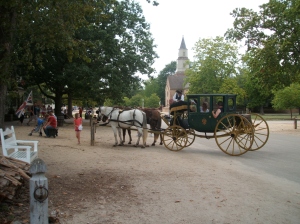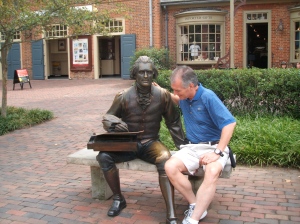by Jim Cathcart
Consider these questions as you think about the formation of a new nation.
What were the issues our Founding Fathers had to deal with?
How long was it after our Declaration of Independence from England that we won the war and achieved a general peace?
What were the internal struggles going on between Americans re: the separation from England where all their ancestors and many of them personally had grown up?
In the early stages of the struggle, what was the source of tension that caused us to finally shout “We’ve had enough!” and declare our independence?
How long did communication take to reach the colonies from England, France and even from the other colonies? What was the effect of that long delay?
Last week Paula and I toured Colonial Williamsburg, Jamestown and Yorktown, VA. We walked the Yorktown battlefield, circumnavigated the peninsula around Jamestown, and stood spellbound as various Patriots delivered public addresses on the streets of Williamsburg. It was inspiring and enlightening. It took us back to the roots of our culture and showed us (upon reflection) the parallels with countries like Afghanistan and Iraq, and even China where new leadership is faced with the same fundamental decisions of how to structure a government and society wherein personal freedom is encouraged.
The beauty of Williamsburg is that it is frozen in time. The people who live and work there are dressed and rehearsed in the mindset, history and behaviors of the 1770s. They know their history, their character’s philosophy, religion, demeanor, circumstances and vocal patterns. When you ask one of them a question about something that occured later in history, they look at you puzzled as to what you are talking about? When the president of the College of William & Mary entertained questions after a sermon in historic Wren Chapel, he inquired as to where I was from. I answered California. He had no frame of reference to understand what or where California was (for him it was still 1774) so he turned to a man from Virginia and asked where his home was.
One particularly impressive speech was delivered by Colonel George Washington. Not yet General nor President. He was encouraging a boycott of all English goods; civil disobedience if you will. He said (I paraphrase), “Are we not free to purchase or not purchase that which we wish? I am not suggesting that you break any laws, just that you refuse to continue commerce with those who are seeking so eagerly to tax us at every turn. I do not condone the destruction of another’s property as the vandals in Massachusetts did with the shipment of tea. I simply believe that the best way to stop these intrusions is to cease commerce with England.”
The colonists were being taxed on what England considered luxuries: paper (The Stamp Act), tea, etc. They had no representation in England that wasn’t totally biased toward the Crown so there was no way to effectively debate what the Crown imposed. They were mostly proud to be “Englishmen” but the treatment was unfair and led ultimately to such abuses of power that the colonists cried, “Enough!” and declared independence from England, thus commencing a long and costly war that claimed lives and fortunes for many years.
Here is a quote from the Yorktown Battlefield’s website as to when it finally was won.
Colonial National Historical Park – Yorktown Battlefield
On October 19, 1781, a British army under General Charles Lord Cornwallis was forced to surrender to General Washington’s combined American and French army. Upon hearing of their defeat, British Prime Minister Frederick Lord North is reputed to have said, “Oh God, it’s all over.” And it was. The victory secured independence for the United States and significantly changed the course of world history.
Size of the armies: 8,800 Americans, 7,800 French and 6,000 British
Our reliance on the support of France during this campaign is often forgotten. There were our competitive advantage. They provided the naval blockade and thousands of foot soldiers that made this victory possible.
In those days the way news travelled was on horseback and by ship. Sometimes it was weeks or months before people learned the “news.” Simple communication to coordinate affairs was not so simple. People had to make decisions based upon what they knew and what they assumed to be likely. Our colonists were ruled by a Governor appointed by the Crown and who answered only to the King. There were “Burgesses” to represent us but when they displeased the Governor, he’d simply dismiss them and send them home.
We had religious factions: Church of England (the official church), Romans (catholics), Lutherans, Calvinists, Baptists, Quakers, and more. Unofficial churches were simply tolerated, not accepted.
There were large contingents from other European countries and cultures. Domestically we had farmers and merchants, shipbuilders, tradesmen, and our society was largely self sufficient. If you didn’t make it, you usually didn’t have it unless you could occasionally travel into town to trade for it. Slavery was common and, though obviously wrong, so widely practiced that it was considered normal to own slaves.
When you experience, even as a tourist, the lifestyle, attitudes, daily practices and discussions in Williamsburg, you begin to understand how complex and difficult it is to create a nation.
The right balance between liberty and government. The mix of laws and freedoms. The choice of practices that run the building of public roads, establishment of services, utilities, creation of an army and determination of how it will be governed. These and more vital decisions face the new leaders.
It is important to know that without a faith in a higher power people descend into pragmatism and lose their sense of purpose and conviction. When we abandon our belief in democracy as the best way for people to govern themselves then we begin internal conflicts that lead to manipulation and deceit. When we loosen our grip on civility and standards of behavior then we become barbaric and inconsiderate. The next step is selfishness and rudeness, then agression.
But with the encouragement of faith, democracy and civility we create a culture wherein caring and sharing are encouraged. People look forward to their dealings with others and begin to consider the needs of others in even their most personal plans.
Today as we enter the last phase of our national elections it is useful to remember how tremendously complex our leadership responsibilities are. We have vital issues that must be resolved with wisdom, utilizing our accumulated knowledge of 200+ years of discussion and experimentation, and adapting to new realities never envisioned by our founders.
But as we consider this, it is refreshing to know that even in the early colonial days there were the same underlying issues to resolve. Even then, and after the war of independence, we still had those who claimed the war was unnecessary, England should be rejoined and all our efforts had been wasted. There were still rumblings of this divide to be seen generations later.
So, as you listen to the political speeches over the next several weeks, remember that this is a modern example of an ancient process. The unsavory tactics and character assasination that are so frequently used have always been part of the process. That doesn’t make them good but it eases our sense of cultural decay in witnessing them. Our society is not declining into barbarism but rather it is going through the eternal growing pains of becoming what it can be.
Freedom will always include elements that we didn’t personally choose or condone. But it, more importantly, contains the power to choose what we will do, with whom we will do it, where we will go and what we will apply our energies to. That freedom allows us to become the individuals we were genetically and divinely designed to be.
May God bless you and God Bless America.






